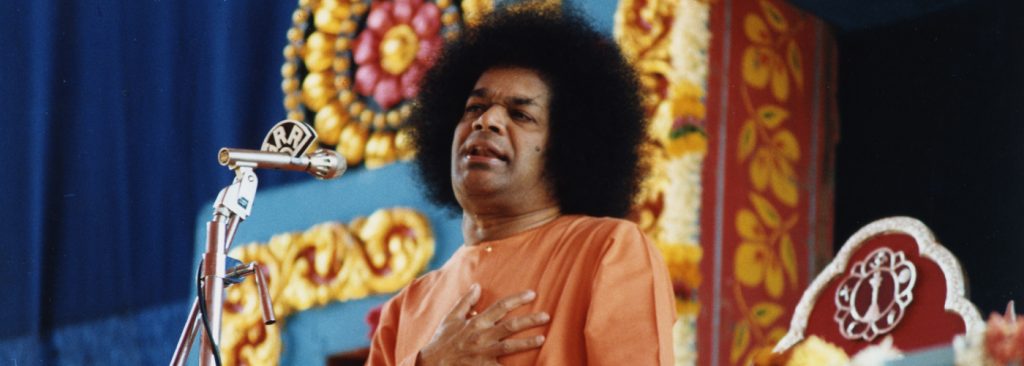
Sri Sathya Sai speaks of Ceiling in Desires
The programme has four components
Members appear to be confused about the true meaning of this programme of “Ceiling on Desires” decided on at the Tenth All India Conference of Sathya Sai Organisations. There are four components in the term “Ceiling on Desires.” They are, respectively; curb on excessive talk, curb on excessive desires and expenditure, control of consumption of food, check on waste of energy. Man needs some essential commodities for his sustenance and he should not aspire for more. We can learn a lesson in this respect from Nature. Only if air is available in sufficient quantity will it be comfortable and good. If it is excessive and there is a gale you will feel uncomfortable. When you are thirsty; you can consume only a limited quantity of water. You can’t consume the entire water of the Ganga! We take only as much as is needed for the sustenance of the body.
Doctors know that the body temperature is normally 98.4. If this goes up to 99 they say fever has set in due to some disorder in the body. We inhale and exhale at a normal rate. If there is a slight increase or decrease in the rate it indicates disorder in the body. Changes in the pulse rate or blood pressure also indicate a disorder. So you find that if you cross the limits even to a little extent it is dangerous or harmful to the body. There is a limit for everything to function in a normal way. When your eyes happen to see a flash of lightning or a flash light while taking photographs, they automatically close because they can’t withstand such high illumination. Eardrums also cannot tolerate hearing beyond a certain volume and we close our ears or keep cotton inside the ears. From these, we see that our life is a limited company!
Similarly, our desires also should be limited. […] Misuse of money is a great evil. […] Money is Daivaswarupam (embodiment of Divinity). When you talk of wealth you should be careful to avoid avaricious accumulation and extravagant expenditure. Even in the preparation of food, you should be careful in avoiding wastage. We are only doing a disservice by consuming more food than is necessary for the body.
Thirdly, you should be careful about ‘time‘, which is the yardstick of life. Seconds become hours, hours become years, years make yugas (ages) and so on. You should not waste this most valuable ‘time‘. Time lost in wasteful pursuits can’t be got back by any means. All our activities should be planned for utilising the available time to maximum advantage. So, we should not waste food, money, time and energy. Even in the purchase of garlands, you need not waste money. What God wants is the flower of your heart that is filled with humility and devotion. Eight types of flowers can be offered to God, viz, (1) Ahimsa (Non-violence), (2) Indriya Nigraha (Control of senses), (3) Sarvabhuta Daya (Compassion towards all beings), (4) Satyam (Truth), (5) Dhyanam (Meditation), (6) Shanti (Peace), (7) Vinaya (Humility), (8) Bhakti (Devotion).
Sathya Sai speaks Volume 16, Discourse to active workers of the Sri Sathya Sai Organisations, Tamil Nadu at Abbotsbury, Madras, 19 January 1983
Prevent waste
There is a programme connected with Ceiling on Desires. You must realise that this programme has not been launched to raise funds. The object of the programme is to prevent the waste of money, time, food or other resources and to use all these for the welfare of the people. The money that is saved need not be kept for the Sathya Sai Organisations. It may be used in the best way you choose for the benefit of others. Do not waste time. Time wasted is life wasted. Time is God. Sanctify all the time at your disposal by undertaking seva activities in a pure and unselfish spirit.
Today we waste time on unnecessary and unwanted things, in indulging in unnecessary talk and doing meaningless actions. In all these actions we are sacrificing the body to time. Instead, we should try to make time our servant. It means spending our time in good thoughts and good deeds. Every second of your daily existence you must ask these questions “How am I utilising time? Is it for a good or bad purpose?”
Likewise, with regard to food, you must ask: “Am I just eating what I need or more? Am I wasting food?” So also with regard to money: “Am I using this money for my own selfish needs or for boosting my name and fame, or to satisfy my ego and vanity?” Once you start seeking answers to these questions, there is no greater sadhana.
These are the. aims of the “Ceiling on Desires” programme. It was never the purpose of this programme to collect money for the Sathya Sai Organisations. The object was to encourage you to share your money with others, and to give you an opportunity to utilise your surplus resources for some good and noble purpose which will sanctify your life.
Three types of strength are given to a person: physical strength, mental strength and the power of money. It has been said that all these should be offered as yajna (sacrifice). This sacrifice is not offered to God. God, who has given you the body and the mind, does not need them for himself. God is also the source of all wealth. What does He want with your wealth? Use it for sacred purposes. The seva programme is intended only to provide you with opportunities to make your lives sacred and worthwhile. It is to develop the spirit of sacrifice.
Sathya Sai speaks Volume 17, The Mandir, Prasanthi Nilayam, 14 July 1984
Protect nature
To protect Nature, man has to practice Ceiling on Desires. He should not trigger the negative aspect of Nature. In this respect, scientists have no concern for the harmful effects that may accrue to society by their inventions. They don’t care for the welfare of mankind and go on making use of intelligence to produce their weapons of destruction.
Sathya Sai speaks Volume 26, Discourse in the Kaamaraj Memorial Hall, Madras, on 21-1-1993.
Man has to consider himself as a limb of society and help in the welfare of society, just as the organs of one’s body are used for one’s well-being. Again society is a limb of Prakrithi (Nature) and Prakrithi is a limb of Paramaathma (Supreme Lord). Thus there is a close relationship between man and God. Nature is more progressive than man, and to protect Nature, man has to exploit it within limits. When man tampers with Nature recklessly, it reacts adversely and trouble arises. To protect Nature, man has to practice Ceiling on Desires. He should not trigger the negative aspect of Nature.
Discourse in the Kaamaraj Memorial Hall, Madras, on 21-1-1993
Achieve happiness
You have to exercise a ceiling on your desires. There are rules for ceilings about land and property. But you have no ceiling on your desires. Ceiling on Desires means exercising control over them. You can be happy once the desires are controlled.
Your life is a long journey. You should have less luggage (desires) in this long journey of life. Therefore, it is said: less luggage, more comfort makes travel a pleasure. So, Ceiling on Desires is what you have to adopt today. You have to cut short your desires day by day. You are under the mistaken notion that happiness lies in the fulfillment of desires. But happiness begins to dawn when desires are totally eradicated. When you reduce your desires, you advance towards the state of renunciation.
You have many desires. What do you get out of them? You are bound to face the consequences when you claim something as yours. When you claim a piece of land as yours, then you will have to reap the harvest. This instinct of ego and attachment will put you to suffer. You will be blissful the moment you give up ego and attachment.
Sathya Sai Speaks, Volume 32 part1, 14 March 1999, Mumbai
A form of meditation
In the Sathya Sai Organization, a fourfold program of Ceiling on Desires has been laid down. This enjoins on everyone not to waste food, money, time and energy. Avoiding waste of these four forms of gifts from God is spiritual sadhana. It is the means to Self-realisation. Spirituality consists in forgetting worldly concerns and immersing oneself in God. This means sanctifying every action in life, whether it be talking or walking or anything else. Reading and writing are also forms of meditation because they call for concentration. Everything in life can become a form of meditation.
Sathya Sai speaks Volume 26, Discourse to the Summer School at Brindavan on 24-5-1993

